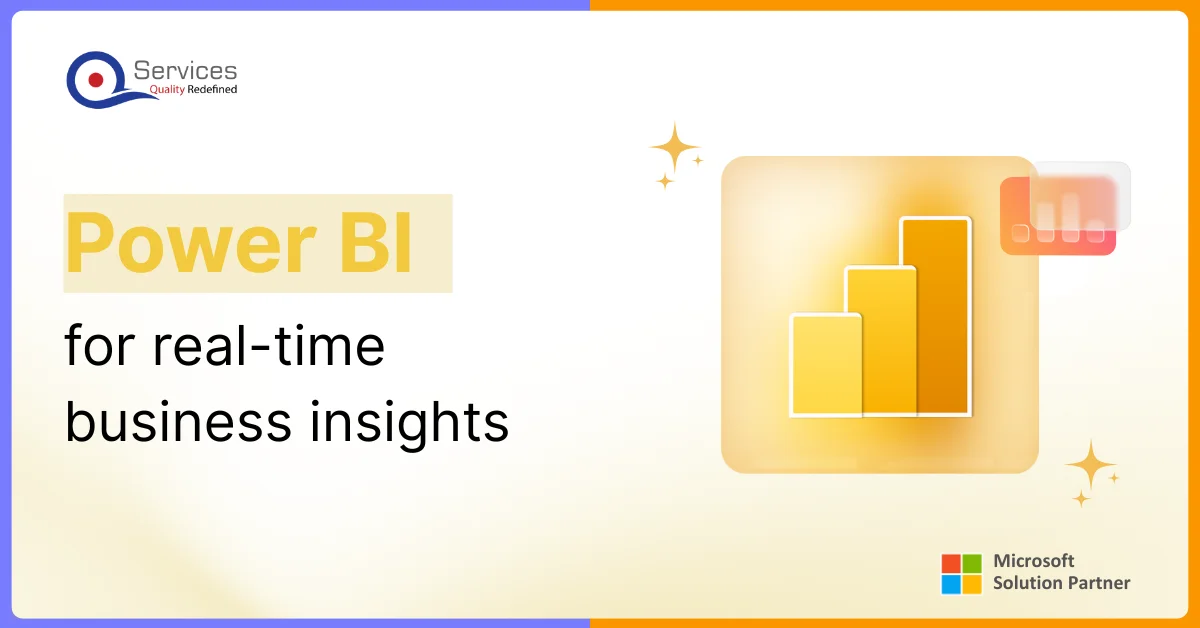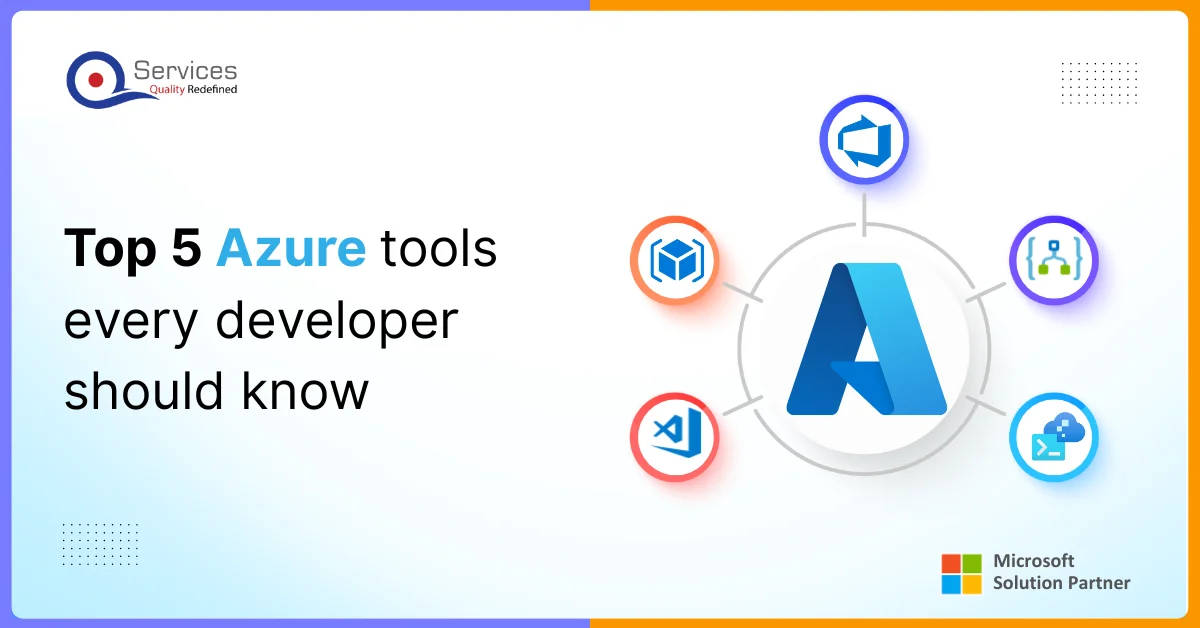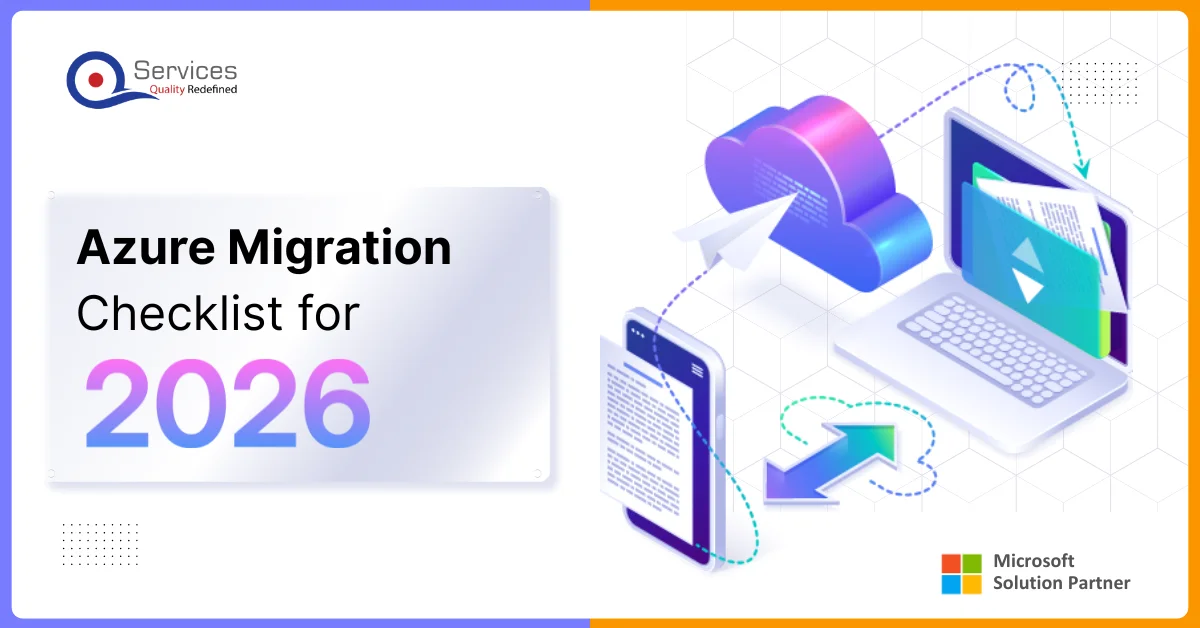
Home » Empowering Insights: Unleashing the Benefits of Azure ML

In today’s fast-paced world, businesses are increasingly adopting artificial intelligence (AI) and machine learning, with 48% already utilizing these technologies by 2024. Azure Machine Learning (Azure ML) stands out as a premier choice, enabling organizations to drive innovation and gain valuable insights through AI. As Satya Nadella, CEO of Microsoft, aptly states, “AI is the defining technology of our times.” Azure ML’s comprehensive suite of tools and services empowers businesses to not only stay ahead of the curve but also set industry standards by transforming data into informed decisions to form a culture of innovation and continuous improvement. In this blog, we will uncover the various advantages of Azure ML and how it can transform business operations.
Azure ML, a cloud-based service by Microsoft, offers numerous ML benefits by allowing data scientists, developers, and organizations to build, deploy, and manage machine learning models efficiently. Key aspects include:
Azure ML supports Python and R for creating models, providing options for both automated machine learning (AutoML) and custom coding. This versatility allows users to leverage various algorithms and frameworks to develop sophisticated machine learning models efficiently.
AutoML simplifies model selection and hyperparameter tuning by automatically exploring different algorithms and configurations. Users can set specific constraints and preferences, reducing manual effort and enhancing overall model performance.
Azure ML facilitates the deployment of models as web services or containers via Azure Kubernetes Service (AKS), Azure Functions, or Azure Container Instances. Built-in monitoring tools and automated retraining capabilities ensure continuous performance optimization, supported by robust versioning and management features.
Azure ML seamlessly integrates with Azure Data Factory, Azure Databricks, and Azure DevOps, streamlining data preparation and enabling efficient CI/CD pipelines. This integration accelerates workflows from development to deployment, boosting operational efficiency and agility.
Azure ML Studio features an intuitive drag-and-drop interface for visually designing ML pipelines. Users can effortlessly connect pre-configured modules to create end-to-end workflows, facilitating rapid experimentation and iteration during model development.
Azure ML supports both batch processing and real-time scoring, scaling horizontally to handle large datasets. This versatility ensures high performance and responsiveness for diverse applications, from real-time decision-making to offline data processing.
Azure ML prioritizes security with robust features such as encryption and role-based access control (RBAC). Compliant with industry standards and regulations, Azure ML safeguards data privacy and governance throughout the entire machine learning lifecycle, ensuring strong Azure Machine Learning security.
Get free Consultation and let us know your project idea to turn into an amazing digital product.
There are several benefits of using Azure ML that helps organizations to innovate and gain valuable insights through AI-driven capabilities:
Azure ML enables deep analysis of large datasets, uncovering valuable insights that drive innovation. Machine learning models help identify patterns, trends, and correlations crucial for strategic decision-making.
Organizations leverage Azure ML to develop predictive models that forecast future trends, customer behavior, and market dynamics. These insights help organizations to make proactive decision for effective business planning.
Understanding customer preferences and behavior is enhanced with Azure ML, facilitating personalized offerings through recommendation engines and tailored user experiences. This capability boosts customer satisfaction and loyalty.
Azure ML revolutionizes workflows by automating tasks such as feature engineering, data preprocessing, and model selection. This enables teams to redirect their focus towards strategic initiatives that drive innovation and foster corporate growth.
Azure ML simplifies the deployment of models into production environments, ensuring seamless integration and optimal performance. Organizations can efficiently scale operations, implement updates promptly, and maintain continuous model monitoring with robust management tools.
Azure ML’s automated deployment features and optimized workflows enable enterprises to dramatically cut down on the time required to implement AI applications. Organizations can sustain a competitive advantage by promptly producing creative solutions that cater to changing client demands, due to this adaptability.
Azure Machine Learning (Azure ML) empowers organizations to extract deeper insights from unstructured data sources through a variety of advanced analytics capabilities while ensuring robust Azure ML security.
Azure ML provides robust algorithms for detecting anomalies, crucial for identifying unusual patterns in data streams. Key applications include:
Detecting fraudulent transactions in financial data to mitigate financial risks.
Monitoring equipment health by identifying deviations from normal operational patterns.
Spotting anomalies in sensor data from IoT devices, ensuring early detection of potential failures.
Utilizing natural language processing (NLP), Azure ML enables sentiment analysis across various textual sources. Applications include:
Analyzing customer reviews to gauge satisfaction levels and identify areas for improvement.
Monitoring public sentiment on social media platforms to understand brand perception.
Assessing feedback from surveys or online forums to derive actionable insights.
Azure ML offers pre-built models for comprehensive text analytics and NLP tasks, facilitating:
Extraction of key phrases, entities, and sentiment from textual data for deeper understanding.
Categorization of news articles or research papers to streamline information retrieval.
Automation of content tagging and classification for efficient content management.
Azure ML excels in identifying and classifying entities within text, essential for:
Extracting relevant information from legal documents to support legal professionals.
Analyzing medical records to identify patient names, conditions, and treatments.
Enhancing search engines by recognizing entities in user queries for improved search relevance.
Using techniques like Latent Dirichlet Allocation (LDA), Azure ML helps in:
Grouping documents into thematic clusters to uncover hidden patterns and insights.
Identifying trends in large text corpora for strategic decision-making.
Enhancing content recommendation systems by linking related topics and content.
Azure ML’s translation services facilitate seamless communication across languages, enabling:
Multilingual customer support to serve diverse customer bases effectively.
Content localization for global audiences, ensuring cultural sensitivity and relevance.
Cross-border communication in international markets to facilitate business expansion.
Azure ML empowers organizations to develop custom NLP models tailored to specific needs, allowing:
Extraction of industry-specific terminology to enhance domain knowledge and accuracy.
Domain-specific sentiment analysis to understand nuanced sentiments within specialized contexts.
Specialized entity recognition to improve data relevance and search precision in specific domains.
Azure DevOps integrates smoothly with Azure ML to create a complete CI/CD pipeline for machine learning models. This automation ensures that every code update triggers automatic integration and testing, simplifying the process from development to production.
Azure ML provides strong deployment pipelines for deploying models as web services or containers using Azure Kubernetes Service (AKS). This setup enables real-time scoring and seamless integration with other Azure ml services, boosting scalability and operational efficiency.
Azure Monitor plays a vital role in tracking model performance metrics, monitoring data changes, and managing resources in Azure ML environments. With proactive monitoring and alerts, Azure Monitor helps organizations quickly detect and resolve issues, ensuring models perform at their best.
Inventory Optimization: Analyzes historical data and demand patterns to optimize SKU assortment and inventory levels.
Recommendation Engine: Personalizes product recommendations to enhance customer satisfaction and increase sales.
Visual Search: Enables mobile-friendly visual product searches to improve user experience and engagement.
Sentiment Analysis: Analyzes customer feedback sentiment to guide product and service improvements.
Disease Prediction: Uses patient data to predict diseases such as diabetes and heart conditions for early intervention.
Drug Discovery: Accelerates drug development by analyzing molecular structures and predicting efficacy.
Patient Risk Assessment: Identifies high-risk patients for personalized healthcare interventions.
Medical Imaging: Enhances diagnostic accuracy through advanced image analysis techniques.
Anomaly Detection: Identifies anomalies and fraudulent activities within financial transactions.
Credit Scoring: Predicts creditworthiness of applicants using machine learning models.
Algorithmic Trading: Optimizes trading strategies based on market trends and historical data.
Anti-Money Laundering (AML): Detects and prevents financial crimes by analyzing transactional patterns.
Predictive Maintenance: Predicts equipment failures to minimize downtime and optimize maintenance schedules.
Quality Control: Ensures product quality through real-time analysis of sensor data and manufacturing processes.
Supply Chain Optimization: Optimizes inventory management and logistics for efficient operations.
Load Forecasting: Predicts energy demand to optimize grid management and resource allocation.
Fault Detection: Identifies anomalies in power grids for proactive maintenance and system reliability.
Predictive Maintenance for Wind Turbines: Reduces maintenance costs and improves turbine reliability through predictive analytics.
These use cases demonstrate Azure ML’s versatility and effectiveness in leveraging machine learning to solve complex challenges across diverse industries, driving innovation and operational efficiency.

Ethical AI:
As AI expands, ensuring fairness, transparency, and accountability in models becomes paramount. Azure ML leads with robust practices in responsible AI.
Hyper- Personalization:
Azure ML helps businesses to deliver highly personalized user experiences through customized recommendations and tailored Azure Machine Learning Services.
Quantum Computing:
Azure Quantum’s integration with Azure ML promises groundbreaking advancements in tackling complex AI tasks with unprecedented speed and efficiency.
Next-Gen Conversational AI:
Azure ML enables organizations to create natural and engaging customer interactions using advanced language models and cutting-edge chatbot technologies.
Empowering Edge Devices with AI:
By deploying lightweight AI models to edge devices, Azure ML enhances responsiveness and privacy, bringing powerful AI capabilities closer to users.
Adaptability through Continuous Learning:
Azure ML supports continuous learning models that evolve and improve over time by seamlessly incorporating new data, ensuring ongoing relevance and effectiveness.
These advances demonstrate how Azure ML is leading the way in AI innovation and enabling companies in a variety of sectors to benefit from cutting-edge technologies.
In a world increasingly defined by data and automation, the Azure Machine Learning platform (Azure ML) stands as a transformative force for businesses looking to leverage AI effectively. By democratizing advanced machine learning capabilities through a user-friendly platform, Azure ML empowers organizations to extract valuable insights, enhance decision-making, and drive operational efficiencies across various sectors, showcasing the numerous Azure benefits.
As you contemplate adopting Azure ML, consider its ability to streamline complex workflows—from model development and deployment to ongoing optimization and management.
So, are you ready to get the potential of AI to innovate and scale your operations? Embrace Azure ML and embark on a journey towards digital transformation.
For further insights on selecting the optimal MLOps platform, explore our comparison of AWS SageMaker vs. Azure ML. Let Azure ML guide your organization through the complexities of AI adoption, facilitating agility and readiness for the future.

Our Articles are a precise collection of research and work done throughout our projects as well as our expert Foresight for the upcoming Changes in the IT Industry. We are a premier software and mobile application development firm, catering specifically to small and medium-sized businesses (SMBs). As a Microsoft Certified company, we offer a suite of services encompassing Software and Mobile Application Development, Microsoft Azure, Dynamics 365 CRM, and Microsoft PowerAutomate. Our team, comprising 90 skilled professionals, is dedicated to driving digital and app innovation, ensuring our clients receive top-tier, tailor-made solutions that align with their unique business needs.

In 2026, it’s vital for every developer to be skilled in using the right set of Azure developer tools for cloud projects. Microsoft’s Azure cloud platform is at the center of this shift, providing a wide range of solutions for building and managing apps. With cloud development with Azure, teams can launch reliable apps that scale globally and respond to business needs in real time. Picking the right items from the Azure tools list can save time, money, and help you get better results.

In 2026, moving workloads to Azure cloud migration is not just about transferring data. It’s about making the whole process smarter, more automatic, and easier to manage while keeping compliance and security tight.

The way small and medium-sized businesses (SMBs) operate has changed more in the past five years. Traditional systems that once felt reliable are now holding teams back. Data lives in silos, processes rely on too much manual work, and the cost of maintaining legacy servers keeps growing. So how do businesses modernize without disrupting what’s already working?
Azure Machine Learning offers several key benefits:
ML as a Service: It provides a pay-as-you-go service model, allowing for cost-effective scaling of machine learning operations.
MLOps: Azure ML supports Machine Learning Operations, streamlining the build, test, and deployment process of ML models.
Interoperability: It is compatible with open-source frameworks, facilitating integration and management of data and models.
Security: Azure ensures a compliant and secure environment for machine learning applications
Azure provides businesses with scalability, flexibility across a range of services, cost-effectiveness with pay-as-you-go pricing, advanced security, global compliance, and continuous innovation, empowering efficient and reliable operations and growth.
Machine learning platforms offer significant advantages, including faster time-to-market for deploying ML models, improved accuracy of predictions due to advanced algorithms, scalability to handle large datasets and workloads, and cost-effectiveness by reducing the need for in-house infrastructure and expertise.
Key use cases of Azure ML include predictive analytics, personalization, fraud detection, and more, all while providing tools for collaboration and integration with existing systems.
MLflow not only provides an open-source standard for tracking ML experiments but also offers functionalities to improve productivity:
Autologging: Automatically tracks hyperparameters, metrics, artifacts, and models across various machine learning frameworks.
Integration with Azure Machine Learning: Lift and shift ML experiments to Azure Machine Learning without changing code, benefiting from productivity and scalability.

Founder and CEO

Chief Sales Officer
